Men’s Speedskating 1000 (long track)
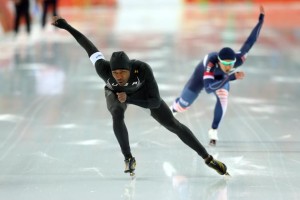 Shani Davis is one of the most accomplished athletes competing at these Olympic Games – highlighted by his gold-medal wins in this event at the 2006 Torino Olympics and 2010 Vancouver Olympics. Therefore, he could be forgiven a little chip on his shoulder watching far less accomplished athletes get lucrative commercial endorsements that should’ve been his.
Shani Davis is one of the most accomplished athletes competing at these Olympic Games – highlighted by his gold-medal wins in this event at the 2006 Torino Olympics and 2010 Vancouver Olympics. Therefore, he could be forgiven a little chip on his shoulder watching far less accomplished athletes get lucrative commercial endorsements that should’ve been his.
 Frankly, I cannot think of any reason, except racism, to explain why Visa, a major sponsor of these Games, would run commercials featuring Sarah Hendrickson, who had never even competed, let alone won a gold medal. And when she finally had a chance to become an Olympic champion in her only event in Sochi, Women’s Ski Jumping, she placed 21st. What, pray tell, does a brother to have do?!
Frankly, I cannot think of any reason, except racism, to explain why Visa, a major sponsor of these Games, would run commercials featuring Sarah Hendrickson, who had never even competed, let alone won a gold medal. And when she finally had a chance to become an Olympic champion in her only event in Sochi, Women’s Ski Jumping, she placed 21st. What, pray tell, does a brother to have do?!
Meanwhile, like Shaun White, Davis came into these Games hoping to pull off the hallowed feat of winning gold in the same event at three consecutive Olympic Games. As I duly noted in my Day 4 commentary below, White failed in his bid, spectacularly. Therefore, Davis entered today’s event knowing that, if he wins, he’d be the first (male) Winter Olympian in history to threepeat.
In Olympic history, Germany’s Claudia Pechstein and the U.S.’ Bonnie Blair are the only two long-track speed skaters that have won three gold medals in the same event at consecutive Olympic Games.
(Bleacher Report, February 12, 2014)
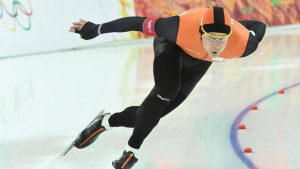 Incidentally, after listening to commentators and reading news reports, you might think no athlete had ever accomplished this threepeat feat. Yet no less an Olympian than Michael Phelps did it at the London Olympics just two years ago in not just one but two events: the 100m Butterfly and 200m Individual Medley. But such is the nature of fleeting Olympic glory.
Incidentally, after listening to commentators and reading news reports, you might think no athlete had ever accomplished this threepeat feat. Yet no less an Olympian than Michael Phelps did it at the London Olympics just two years ago in not just one but two events: the 100m Butterfly and 200m Individual Medley. But such is the nature of fleeting Olympic glory.
Alas, Davis wasn’t even close; in fact, he fared even worse in his threepeat bid than White did. Davis finished eighth. He’ll be lucky now to get any recognition at all from the media that have always given him short shrift and corporate sponsors that have always treated him like, well, a token Black Winter Olympian.
Stefan Groothuis continued the Netherlands’ dominance in Speedskating by winning gold. Actually, Denny Morrison of Canada only narrowly foiled a Netherlands one-two punch by winning silver. Groothuis’s teammate Michel Mulder won bronze.
Women’s Downhill
Just as the combination of power and finesse makes women’s Tennis far more entertaining to watch than men’s, this same combination, plus speed, makes women’s Downhill far more entertaining to watch than men’s.
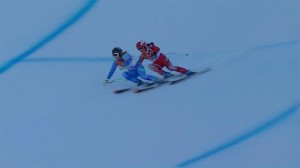 This was borne out in unprecedented fashion today as Dominique Gisin of Switzerland and Tina Maze of Slovenia finished in a tie, making this (according to NBC) the first time in Olympic history two gold medals were awarded in the same event. Olympic competition could not possibly get any more thrilling than that; well, unless we see two female Olympians battling to a tie in one of those grueling cross-country events — with Chad Salmela doing color commentary.
This was borne out in unprecedented fashion today as Dominique Gisin of Switzerland and Tina Maze of Slovenia finished in a tie, making this (according to NBC) the first time in Olympic history two gold medals were awarded in the same event. Olympic competition could not possibly get any more thrilling than that; well, unless we see two female Olympians battling to a tie in one of those grueling cross-country events — with Chad Salmela doing color commentary.
I was pulling for my favorite Winter Olympian, Julia Mancuso of the United States, to win. And I was very encouraged after she posted the fastest Downhill time in the Women’s Combined on Day 3. Unfortunately, she lacked speed and control when it really mattered. She finished eighth.
Pairs Figure Skating
Figure Skating is arguably the most popular sport at the Winter Olympics, but it does not come even close to being my favorite. Mind you, having spent more time on my butt than on my skates trying to do just a little of what figure skaters do, I really appreciate the skill and athleticism they display on ice. Therefore, it’s more out of respect than interest that I’m commenting on this event.
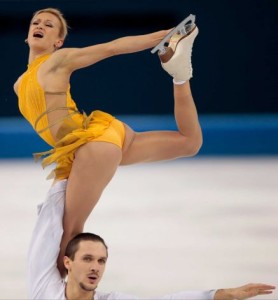 After performing a nearly flawless routine to help Russia win gold in the inaugural Team Figure Skating event on Day 2, the Russian pair of Tatyana Volosozhar and Maksim Trankov were heavily favored to win gold here too. But they were helped by a distinct advantage all Russian athletes are enjoying at these Games.
After performing a nearly flawless routine to help Russia win gold in the inaugural Team Figure Skating event on Day 2, the Russian pair of Tatyana Volosozhar and Maksim Trankov were heavily favored to win gold here too. But they were helped by a distinct advantage all Russian athletes are enjoying at these Games.
The reason successful athletes invariably thank their fans is that home fans not only boost their confidence and lift their performance but also influence referees to make calls and judges to give scores in their favor. No less significant, though, home fans often unnerve opposing athletes and frustrate their performance. For obvious reasons, this home-fan factor is especially effective at indoor venues like those where figure skating competitions are held.
Granted, athletes from the host county always enjoy an advantage in this respect. The difference at these Games, however, is that so many fans from other countries have been scared away that, instead of the normal 2-to-1 ratio, Russian athletes are enjoying a local-to-foreign ratio among fans of more like 10-to-1. Indeed, one would have been hard-pressed to see banners from any other country waving in the arena throughout this competition.
 But let me hasten to clarify that Volosozhar and Trankov deserved to win gold (they are reigning world champions after all). What’s more, their teammates won silver fair and square. In fact, winning gold was merely restoring the old world order in this event, in which the Russian pair won gold for 12 consecutive Olympics from 1964 to 2006 – often with another Russian pair standing on the podium too, taking either silver or bronze.
But let me hasten to clarify that Volosozhar and Trankov deserved to win gold (they are reigning world champions after all). What’s more, their teammates won silver fair and square. In fact, winning gold was merely restoring the old world order in this event, in which the Russian pair won gold for 12 consecutive Olympics from 1964 to 2006 – often with another Russian pair standing on the podium too, taking either silver or bronze.
The point is that the German pair of Aliona Savchenko and Robin Szolkowy had a legitimate shot at … silver. But entering that skating rink in Sochi today must have felt for them (and all non-Russian pairs) like entering a lion’s den. The way they skated showed that they were duly unnerved.
To be fair, the Russian fans were relatively hospitable. And they became especially so after the German pair tripped over themselves just seconds into their routine, assuring the Russian pairs of silver and gold. Indeed, given that the German pair tripped over themselves at the end of their routine as well, it’s arguable that the (pitying) cheers they got from the Russian fans influenced the judges to award them bronze.
Send in the Clowns? Where are the Crowds?
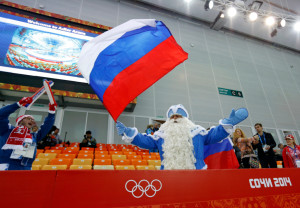 I promised in my Day 1 commentary below not to harp anymore on the eyesore of empty seats at so many venues during these Games. But I cannot resist commenting on what I saw when I tuned into NBC, the official network, this morning. Because I was greeted with the utterly surreal image of the TODAY team sitting outside looking like clowns who showed up for the party after all the kids had already gone home.
I promised in my Day 1 commentary below not to harp anymore on the eyesore of empty seats at so many venues during these Games. But I cannot resist commenting on what I saw when I tuned into NBC, the official network, this morning. Because I was greeted with the utterly surreal image of the TODAY team sitting outside looking like clowns who showed up for the party after all the kids had already gone home.
Bear in mind that the TODAY team is famous for taking the show outside the studio to mingle with gawking fans. No doubt this is what they had in mind. Except that there was nobody there. But it was 6pm Sochi time, at the friggin’ Olympics, when you would’ve expected the grounds to be teeming with spectators (local and foreign) – many of them fighting to be caught on TV. Nothing, nobody!
Of course, NBC anchors dare not complain. After all, they were among the Chicken Littles scaremongering about terrorist attacks in the run up to these Games. And, once they arrived, they only scared off more visitors with snarky reports that made it seem like Sochi had little to offer them beyond broken toilets, undrinkable water, and stray dogs. Which is why Russians outnumber foreigners at most sporting venues 10-to-1. Indeed, spotting a foreign fan at these Olympics is like spotting an oasis in the desert: beware the mirage….
MEDAL COUNT
Norway: 12; Canada: 10; Netherlands: 10